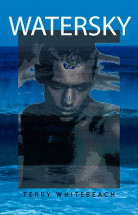An interview with a stranger: Terry Whitebeach

by Fran Knight
Dubbing herself a 'stranger in a strange land', the current May
Gibb's Fellowship recipient, Tasmanian author, Terry Whitebeach, has
found that her recipe for writing in the quietness and solitude of
the apartment in Norwood has included visits to the Art Gallery and
Botanic Gardens, as well as the odd lunch. Today we met at Cafe Ivy
on Norwood Parade to discuss her body of work and its motivating
forces.
Terry's body of work includes two poetry collections, Bird Dream,
and All the Shamans Work in Safeway, an indigenous life
history, The Versatile Man, radio plays for ABC's Airplay,
as well as reviews and essays published in journals. With two young
adult novels also behind her (Watersky
(1998) and Bantam
(2002) as well as two bilingual picture books, When I was a Boy
in Sudan and When I was a Girl in Sudan (2014)), Terry
is currently working on a novel for younger readers, a niche market
which is undernourished.
In this multicultural country, Terry has met and taught many
refugees in adult literacy classes. These people surely must be the
epitome of a 'stranger in a strange land', having to cope with a
different culture, language and ethos, often after many difficult
years spent in refugee camps.
Whilst working in adult literacy, she met her Sudanese colleague
Sarafino Enadio, and has worked with him to create four books. The
first to be published were a pair of bilingual picture books for
Sudanese as well as English speaking readers, with the aim of
Sudanese and Australian children developing a better understanding
of each other. These picture books depict the traditional life of
children in Sudan.
Sarafino's ten years in a refugee camp were the catalyst for a young
adult novel, Obulejo, Trouble Tomorrow, on which Terry and
Sarafino also collaborated, after visiting South Sudan together in
2012. In 2014 they published an account of Sarafino's life, A
Little Peace, a South Sudanese Refugee Story.
But Paper Chains is what she is working on while in
Adelaide. A novel for younger readers, it is the story of the
adventures of six sisters. As with all her novels, it began with an
imaginary conversation. This time between a set of sisters. When
Terry first 'overheard' the sisters talking to each other she felt
compelled to begin to write down their conversations. At first it
felt a little like eavesdropping, but Terry nevertheless continued
to listen in.
I asked Terry if she had any difficulties writing from a female
perspective, as her young adult books all have had male leads. None,
she explained; she was brought up in a family of six girls, so has a
rich resource from which to draw her ideas.
Although Terry was not forthcoming with many details of this new
book, while in Adelaide she will further flesh out the story she
feels she must write, of six sisters and their hair-raising
adventures, and the way they face and overcome difficulties together
and win through. The title of her new book, Paper Chains
came to her as an image of a string female figures joined yet
individual: its significance will become more apparent as the
narrative develops.
As an author concerned with marginalised and silenced or excluded
groups and individuals, speculation about the threads of her new
novel have tantalised me and I look forward to reading it.